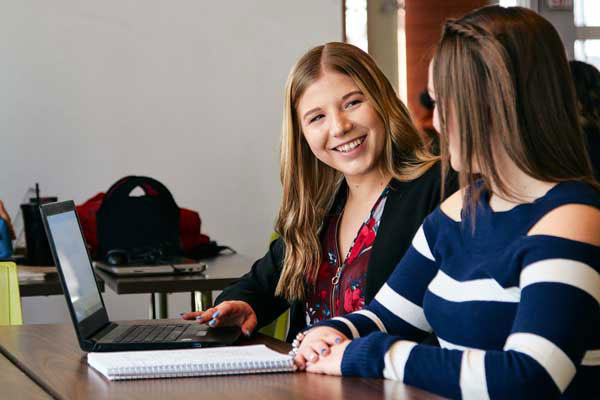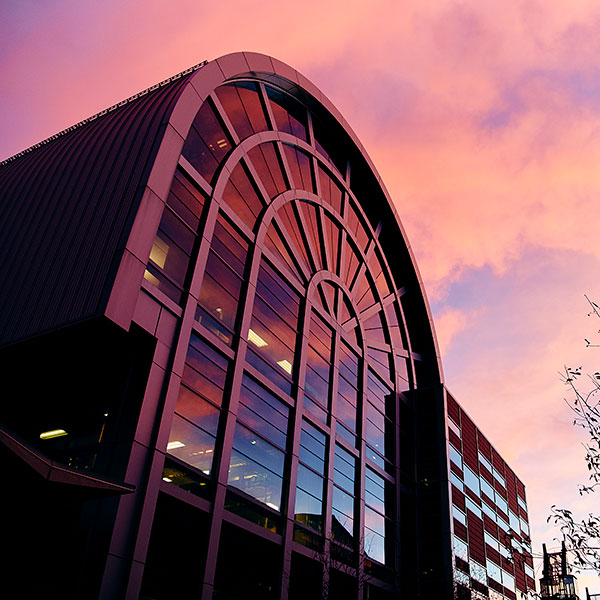On this page:
Overview
Our Civil Engineering Technology program is designed to forge professionals equipped to design, draft, cost, and manage the construction of various infrastructure projects, including buildings, roads, bridges, and more.
This two-year, intensive program offers hands-on learning combined with theoretical knowledge and the use of advanced technology. Embark on a journey encompassing all facets of civil engineering design and construction management, from foundational building science to 2D and 3D drafting, supported by the latest virtual and augmented technology.
Apply your learning in real-world construction engineering scenarios, mastering structural and geotechnical engineering principles, construction estimating, and project scheduling.
The program offers several intakes each year to accommodate your schedule. The program structure adjusts depending on your start date, allowing for semester breaks or continuous study with short breaks.
Ahead of your second year, you'll select one of three specialized majors - construction management, municipal, or virtual design and construction. While we'll do our best to accommodate your preference, selection for each major is determined by the cumulative grade point average (GPA) from your first year, should a specific specialization be in high demand.
Virtual Design and Construction major
Virtual Design and Construction majors focus on:
- advanced construction communication technology
- digital drafting
- design delivery in the virtual world from 2D to 3D in augmented reality (AR) or virtual reality (VR).
You will be prepared for a variety of civil engineering jobs and roles in commercial construction, from site management to project leadership positions. The curriculum is built with industry input, ensuring your acquired skills are relevant and sought after.
This diploma program is not just about gaining a credential; it's about building a career. If you aspire to be at the forefront of the construction industry, innovating and leading in civil engineering design and construction management, this program is your gateway.
Those in civil engineering technology tend to be innovative, methodical, and directive.
You need:
- math and science skills, specifically an aptitude for physics
- organizational abilities
- an analytical mind
- problem-solving skills
- the ability to work alone
- the flexibility and commitment to work overtime when required to meet deadlines
- the ability to communicate effectively with project managers and contractors.
You should enjoy taking a systematic approach to your work, finding innovative solutions to problems, and providing direction to others.
Graduates of this program with a minimum 2.3 cumulative GPA (67% or C+) may apply for SAIT's Bachelor of Science Construction Project Management program.
You'll participate in a capstone project where you'll develop a proposal through research, data collection and analysis and present your findings to faculty and industry guests.
This program is nationally accredited, at the technologist level, by Technology Accreditation Canada.
Graduates are eligible to join The Association of Science and Engineering Technology Professionals in Alberta (ASET).
The Canadian Institute of Quantity Surveyors recognizes the program as training for qualified estimators and quantity surveyors.

Upon successful completion of this program, you'll receive a SAIT Civil Engineering Technology diploma with a major in Virtual Design and Development.
Careers and opportunities
Our graduates may work in the following occupations. Some careers require additional experience and education.
Associated National Occupational Classification (NOC) codes: 22300, 22303, 70010, 21202, 22211, 22212.

Career planning support
Unsure which career path is for you? Here are some recommended career planning resources to help you decide your future.
You can also head to Alberta alis for lots of information about careers in Alberta, including quizzes and labour market information to help you narrow down a path.
Finally, you can take our online career finder quiz, which can help narrow your options based on your current skills and interests.
Courses
The Civil Engineering Technology diploma program requires 61.5 (24 courses) to complete.
This program has fall, winter and spring intakes.
If you start in the fall, you'll study for two semesters per year with a summer break.
If you start in the winter or spring, you will study for four consecutive semesters and have one or two-week breaks between semesters.
Civil Engineering core
| Course | Credits |
|---|---|
|
This course introduces students to the fundamental drafting techniques used in the Civil Engineering field. Students will first learn the basic functions of computer-aided design and drafting (CADD) and then use CADD software to create drawings related to the civil engineering field such as excavation cross sections, simplified roof framing plans, environmental site plans, subdivision plans and traverses. Pre-requisites:
|
1.5 |
|
This theory and lab-based course introduces the fundamentals of concrete technology starting with the ingredients and properties of concrete, and common terminology used to describe plastic and hardened concrete. Manufacture of Portland cement and the different types of Portland cement available in Canada are discussed, including Portland Limestone Cement. The classification and types of aggregates used in concrete are discussed along with their properties. Supplementary cementitious materials and chemical admixtures are introduced and their importance for concrete strength and durability reviewed. The culmination of the course will involve how to design a concrete mix for a specific application and exposure type. |
3 |
|
This is an introductory course in soil mechanics providing the fundamental characteristics of soils as an engineering material used in the design and construction of civil engineering projects. The topics include an overview of geology and groundwater, field investigation, calculation of soil properties, soil compaction and strength. The course also introduces the testing of soils using American Society of Testing Materials (ASTM) to determine standard soil properties. Pre-requisites:
|
3 |
|
In the Construction Practices course, you will examine various forms of construction, focusing on structures, with the aim of improving the standard and quality of design, construction and maintenance practices. You will also compare and contrast the characteristics of various systems of construction and components to set benchmarks for the selection of materials, components and systems as well as to select the appropriate equipment required to build them. Finally, you will develop a basic ability to read construction drawings which provide the details needed to build a specific structure. Equivalents:
|
3 |
|
This course is designed to develop technical writing and presentation skills to ensure workplace readiness. Students will learn how to evaluate communication situations, analyze documents, assess research sources and develop organizational skills to apply in their work. They will learn about and practice designing, formatting and writing a range of professional documents. Students will also develop confidence (through practice) in the development and delivery of effective and engaging presentations. Equivalents:
|
3 |
|
This applied computer course provides students with critical electronic communications, data and file management skills, along with a strong focus on using common productivity applications to format, calculate, analyze, visualize, and present or report data and information. Equivalents:
|
1.5 |
|
The course involves preparation of quantity takeoffs for excavations, foundations, site services, residential concrete, formwork, wood framing and finish carpentry, interior and exterior finishes. Students will complete a full estimate of a residential project including quantity takeoff, pricing, summary and bid preparation. |
3 |
|
This course enables the student to apply the basic knowledge of algebra and introductory calculus to resolve applied scientific and technological problems. Applications include linear motion, areas under curves, and volumes of revolution. Equivalents:
|
3 |
|
This course gives an introduction to material properties and the methods of analysis used in structural design. Students will learn the concepts of normal stress and strain, shear stress and strain, thermal stress and strain, deformation, and torsional loading. Structural elements will be designed based on material properties and factors of safety. Students will calculate sectional properties such as centroids and moments of inertia and construct shear force and bending moment diagrams for statically determinate beams. Calculation of flexural stresses, longitudinal shear stresses, and deflection will allow beam sections to be selected for structural applications. Column analysis and design are included. Pre-requisites:
|
3 |
|
STAT 245 is an introductory course in data analysis for students in engineering technology programs. Students apply techniques to organize, display, analyze and report data. Outcomes include methods of descriptive and inferential statistics. Students will be exposed to software-based methods in laboratory sessions using industry-grade data. Some advanced topics of analysis are selectable toward the end of the course. |
3 |
|
This course provides foundation skills in the analysis and design of structural and civil engineering applications. Students will analyze civil engineering structures containing simple coplanar force systems using the concepts of static equilibrium, force components, moments, free body diagrams and centroids. Students will also determine the support reactions for statically determinate beams and in two-dimensional pin-connected systems such as frames and trusses. |
3 |
|
This course focuses on an introduction to surveying including measurement of angles, distances, and performing traverses. Students will learn to calculate 3D coordinates of surveyed points as well as stake-out points extracted from design drawings. |
1.5 |
Virtual Design and Construction core
| Course | Credits |
|---|---|
|
This course will provide you with the design concepts required for the selection of structural components and their representation in structural drawings with drafting software. You will study the properties, uses and design considerations of major structural materials, and perform calculations using industry standards to inform structural design at the technologists level. Pre-requisites:
|
3 |
|
Advances in technology and systems used in construction require future construction technologists be aware of available tech tools and how each can be applied to their projects. This course provides information and theory on apps, software and systems available to manage construction and/or to illustrate drawing in various stages of design, drafting and construction execution. Course material will focus on augmented reality (AR) and virtual reality (VR). Pre-requisites:
|
1.5 |
|
In the Advanced Drafting course, you will explore CAD's crucial role in Virtual Design and Construction (VDC) projects. You will learn to relate CAD drawings to VDC functions. Other topics covered include common CAD features, workflows and advanced tools for data management, as well as geometric constructions, 2D projections and interpreting 3D drawings. Moreover, you will master non-parametric CAD usage, creating 3D objects and understanding solid models. Pre-requisites:
|
3 |
|
This course looks at buildings as complete systems. You will explore the interrelation of building systems as they are designed, illustrated, and executed into reality. You will also explore industry practices to mitigate human error in the design process and review construction documents for problems with systems interaction. Pre-requisites:
|
1.5 |
|
In this course you will develop the knowledge and skills required to use advanced building information modelling (BIM) for construction planning. You will learn about the standard workflow of virtual design construction (VDC) software, the role of point cloud technology for construction modelling, and the coordination between BIM and VDC. You will also learn how to select construction modelling software based on project needs, use 4D sequencing software to create a 4D animation of a model and perform clash detection on a construction model. Pre-requisites:
|
3 |
|
This course equips you with practical experience in civil drafting and modelling, using industry-standard software for civil design. You will learn the fundamental features and screen elements of civil design software, and compare the processes involved in point cloud, GPS, and photogrammetry data. You will also learn to create commonly used elevation models in civil design and analyze terrain characteristics with drafting software. Additionally, you will conduct a geospatial transformation of raw survey data to a 3D-compatible format, and implement effective strategies for optimizing a proposed design feature based on a terrain model. Pre-requisites:
|
3 |
|
Piping is designed to allow the safe and efficient movement of fluids. In this course, you will learn about basic piping components, their function, and site-plan layout. You will use modelling software to illustrate piping designs, and produce isometric drawings that will allow you to generate a bill of material. Pre-requisites:
|
3 |
|
Virtual construction management incorporates the planning and execution of construction projects by leveraging advanced construction technologies. In this course, you will analyze the process of construction execution. You will learn about the deliverables, risks, processes, scheduling, and documentation required to execute a construction project as a project manager. You will acquire the skills needed to integrate modelling and applications, apps and software into the execution of a project at various stages. Pre-requisites:
|
3 |
|
Advancements in AR and VR technologies continue to emerge and enhance civil engineering processes. This course will look specifically at the use and practical application of AR and VR in the design, construction and operations phases of the construction lifecycle. You will use industry-current technology, software and data collection, interpretation, and model integration to address real-world problems in the construction industry. Pre-requisites:
|
1.5 |
|
Buildings are complex systems, and building projects require more advanced drafting and illustration for design, systems interactions, clashes and construction execution. This course provides practical drafting and illustrations skills specific to mechanical, and electrical systems of buildings. You will learn about design, clash detection, prefabrication, illustration and site data collection, interpretation, and applications. Pre-requisites:
|
1.5 |
|
As construction project complexity has increased, the tools used by estimators have evolved to include 2D and 3D digital pricing of the work. You will explore various methods of acquiring data from tender documents and converting that information into a price for your customer. You will price self-performed work, evaluate subtrade quotes, and assess risk for various projects. Both 2D PDF files and digital models will be used for your work. Pre-requisites:
|
3 |
Progression
You must attain a PGPA and/or a CGPA of 2.0 or better each semester and pass the prerequisite courses to progress through the program.
To qualify for graduation, you must pass all courses, attain a CGPA of 2.0 or better and complete course requirements within the prescribed timelines.
Review our grading and progression procedure >

Explore your options!
Some courses in this program are available through Open Studies. You can complete courses via Open Studies to get a head start on your education, reduce your course load once accepted into a credentialed program, or determine which career path best suits you before you fully commit.
You may also take courses for general interest or personal and professional development.
Admission requirements
Applicants educated in Canada
All applicants must demonstrate English language proficiency and meet the following requirements or equivalents:
- at least 60% in Math 30-1, and
- at least 60% in English Language Arts 30-1 or at least 75% in English Language Arts 30-2, and
- at least 60% in Science 30 or Physics 20.
SAIT accepts high school course equivalents for admission for applicants educated outside Alberta.
All applicants who were educated outside of Canada must demonstrate English language proficiency and provide proof they meet the program admission requirements outlined above with an international document assessment. Find accepted educational documents and assessment options.
SAIT may also accept courses completed at certain international post-secondary institutions.

Academic Upgrading
Missing an admission requirement for this program? Upgrade your prior education to help you receive admission into one of SAIT's career programs.

English language proficiency
All applicants must demonstrate English language proficiency prior to admission, including students educated in Canada.
Transfer agreements
At SAIT, we evaluate post-secondary credit you have previously earned and apply it to your SAIT credential. Explore our formal transfer agreements available for this program.
We can evaluate your prior education, even if we don't have a formal agreement in place.
Submit a transfer credit application
There are no formal transfer agreements currently in place for this program.
Transfer options for graduates
Build on the knowledge you’ve learned at SAIT. The opportunity to advance your education at an accredited post-secondary institution may be available.
🔗 Visit Transfer Alberta search tool for all transfer agreements in Alberta (including UCalgary, MRU and BVC).
If there are transfer agreements with other institutions outside of Alberta, nationally or internationally, they will be listed below.
Available intakes
Fall 2025
Start dates:
- Domestic students: Open
-
-
Application deadline: June 30, 2025
-
- International students: Open
-
-
Application deadline: May 30, 2025
-
Winter 2026
Start dates:
- Domestic students: Open
-
-
Application deadline: Oct. 24, 2025
-
- International students: Open
-
-
Application deadline: Sept 26, 2025
-
Costs
2025/26 tuition and fees
The following costs are effective as of July 1, 2025.
The estimated total cost of tuition and fees is based on the suggested schedule of study. Following a modified schedule will impact the fees you pay per semester and may alter final costs.
Domestic students
The program total is based on the estimated amount you will pay if you enter this program during the 2025/26 academic year. The program total amount listed on your letter of admission may appear higher. This amount is your maximum tuition guarantee for the program. SAIT will not exceed this maximum, regardless of changes in tuition and fees between academic years.
Books and supplies are approximately $1,000 - $1,500 per full-time year.
This is a bring-your-own-device program with power-user computer hardware and software requirement. See the specific requirements on our computers and laptops page.
Textbooks and reading materials will be discussed with your instructors during the first week of classes.
Required personal protective equipment (PPE)
The industry-approved PPE you'll need will be discussed during your first few days of classes.
You'll need CSA-approved, above-ankle steel-toe boots, a hard hat, and safety classes for labs and site visits.

Financial aid
Paying for your education may feel overwhelming, but we have resources and programs that can help, including information about payment options, student loans, grants and scholarships.
Application process
When applying in the application portal, select Civil Engineering Technology. You will declare your major before your second year of the program.
Ready to apply?
Follow our step-by-step guide to submitting a successful application.
Communication during admission
Email is the primary source of communication during the selection process. Ensure your personal email account is managed appropriately to receive our emails, files and communications. We recommend you add the construction.advising@sait.ca domain to your safe senders' list or you risk missing critical email messages.

Begin your application
Apply now using the online application portal.
Ensure you have a valid Visa or Mastercard to pay the non-refundable application fee of $120 for domestic applicants or $175 for international applicants.
Information sessions
Prepare for a strong start in your chosen program or get the details you need to decide your future path.
Our expert staff and faculty are ready to answer your questions and provide information about the following:
- What sets SAIT apart
- An introduction to the program and area of study
- Admission requirements
- Future career paths
- Information on the earning potential and graduate employment rates.
Contact us
Prepare for a strong start and get the details you need to make a decision about your future. Our expert staff and faculty are ready to answer your questions, and provide information about:
School of Construction Advising
-
Phone - 403.284.8367
International Student Advising
-
Phone - 403.284.8852
-
Email - international@sait.ca
Subscribe for updates
Your journey starts here! Sign up to get important updates on:
- Business and leadership programs
- Application information
- Relevant news and events

Oki, Âba wathtech, Danit'ada, Tawnshi, Hello.
SAIT is located on the traditional territories of the Niitsitapi (Blackfoot) and the people of Treaty 7 which includes the Siksika, the Piikani, the Kainai, the Tsuut’ina and the Îyârhe Nakoda of Bearspaw, Chiniki and Goodstoney.
We are situated in an area the Blackfoot tribes traditionally called Moh’kinsstis, where the Bow River meets the Elbow River. We now call it the city of Calgary, which is also home to the Métis Nation of Alberta.




